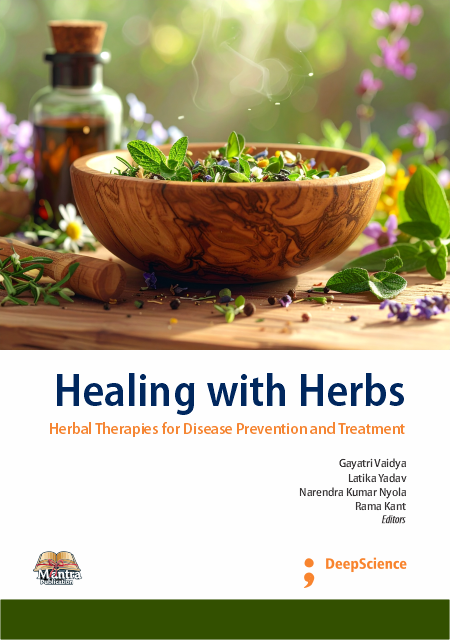Healing with Herbs: Herbal Therapies for Disease Prevention and Treatment
Keywords:
Herbal medicine, Curcumin, Apoptosis, Angiogenesis, Nanocarriers, Phytochemical synergy, Diabetes managementSynopsis
The wisdom of herbal medicine has been interwoven with human civilization for centuries, offering remedies, prevention, and holistic health support. In recent years, renewed interest on herbal therapeutics has taken the scene out of traditional systems towards evidence based and integrative healthcare. Integrating both tradition and science, Healing with Herbs: Ancient Medicinal Wisdom for Modern Times provides a holistic perspective on the usage of plants to promote health and prevent disease.
This volume brings together distinguished scholars, researchers, and practitioners from diverse domains of pharmacognosy, phytochemistry, pharmacology, biotechnology, and clinical sciences. Each chapter highlights the molecular, pharmacological, and therapeutic dimensions of medicinal plants, offering mechanistic insights into how phytoconstituents influence human health. From cancer chemoprevention and hepatoprotection to respiratory care, neuroprotection, gastrointestinal health, and innovative drug delivery systems, the chapters collectively represent the multifaceted applications of herbs in managing chronic diseases.
The book emphasizes not only the therapeutic potential but also the translational challenges—such as bioavailability, standardization, clinical validation, and safety considerations—that accompany the development of herbal formulations. Furthermore, special attention has been given to advanced encapsulation technologies and nanocarrier systems, reflecting the dynamic interface between natural medicine and cutting-edge pharmaceutical sciences.
It is our hope that this book serves as a valuable resource for academicians, researchers, healthcare professionals, and students interested in herbal sciences and integrative medicine. By fostering a deeper understanding of herbal pharmacology and its clinical applications, we aspire to inspire future innovations that contribute to sustainable and safe healthcare solutions.
References
Braga, T. M., Rocha, L., & Cunha, A. P. (2021). Azadirachta indica A. Juss. in vivo toxicity—An updated review. Toxics, 9(12), 349. https://doi.org/10.3390/toxics9120349
Bray, F., Laversanne, M., Weiderpass, E., & Soerjomataram, I. (2021). The ever-increasing importance of cancer as a leading cause of premature death worldwide. Cancer, 127(16), 3029–3030. https://doi.org/10.1002/cncr.33587
ClinicalTrials.gov. (n.d.). Trial of curcumin in advanced pancreatic cancer (NCT00094445). Retrieved from https://clinicaltrials.gov/study/NCT00094445
Cot Food Standards / Committee on Toxicity. (2024). Turmeric and curcumin supplements – Toxicological review. Retrieved from https://cot.food.gov.uk
Duan, X., et al. (2025). Herb–drug interactions in oncology: A systematic review of pharmacokinetic and pharmacodynamic mechanisms. Frontiers in Pharmacology, 16, 1432901. https://doi.org/10.3389/fphar.2025.1432901
Efferth, T., & Koch, E. (2011). Complex interactions between phytochemicals: The multi-target therapeutic concept of phytotherapy. Current Drug Targets, 12(1), 122–132. https://doi.org/10.2174/138945011793591626
Elumalai, P., et al. (2014). Review on molecular and chemopreventive potential of neem constituents. Pharmacognosy Reviews, 8(15), 113–120. https://doi.org/10.4103/0973-7847.134239
Frontiers in Oncology. (2024). Curcumin as a novel therapeutic candidate for cancer. Frontiers in Oncology, 14, 112233.













